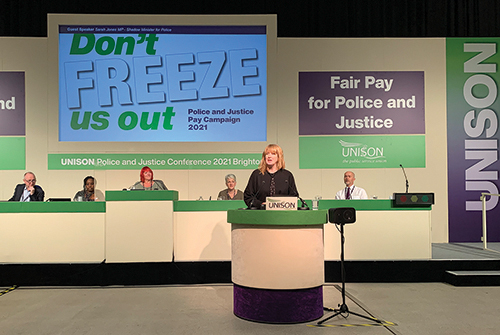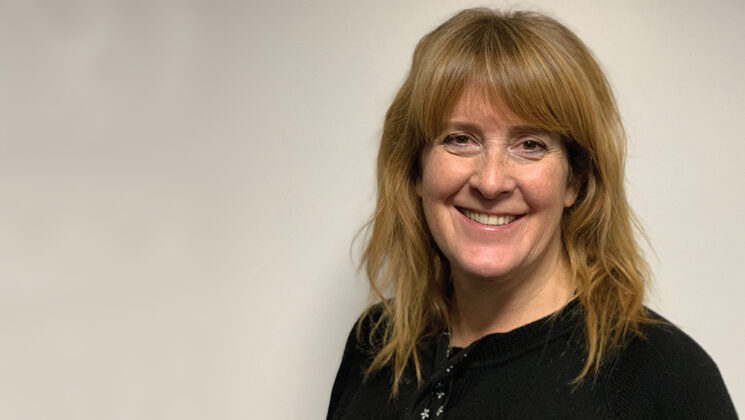“It’s male behaviour that needs to change. It’s not the role of every woman to have to tell every man what normal, responsible, professional relationships are in the workplace.”
For Sarah Jones, Labour’s shadow minister for policing and the fire service, that view is at the heart of tackling violence, abuse and harassment against women and girls.
There are, she says, two sides to the problem. First is the question of “how we tackle the horrific charge rates and lack of justice for women and girls who suffer from violence, in whatever form that might be – and there is a whole raft of work that we need to do on that front”.
But the second aspect is within policing itself. “Following Sarah Everard’s murder, we need to have a root and branch look, through an independent inquiry that has a legal footing, at how the police recruits, deals with members when they’re accused, and how the policing culture works across the country.”
We’re speaking at UNISON’s police and justice conference in Brighton, in October, just a couple of weeks after Wayne Couzens, a serving police officer with the Metropolitan Police, had been handed a whole-life prison sentence for the murder of Ms Everard.
He had initially abducted her, using his warrant card in order to ‘arrest’ her.
It was a crime that shocked the nation – and prompted a number of motions at the conference. And there was more than a passing mention in Ms Jones’s own address to delegates (below).

“Thank goodness that Philip Allott, the Tory police and crime commissioner who said women need to be ‘streetwise’ following Sarah’s murder, finally resigned yesterday.” she said. “The right leadership at the top has never been more important.”
While the circumstances around the killing made it particularly shocking, it was far from the rare event that one might hope.
The organisation Femicide Census has found that a woman is killed every three days in the UK. In October 2021, Karen Ingala Smith, the founder of Counting Dead Women, wrote in the Guardian that at least 81 more women had been killed in circumstances where the suspect was male, in the 28 weeks after Ms Everard’s death.
Not just London
Ms Jones, who is the MP for Croydon Central, stresses that it is important that any inquiry into policing covers the whole country and not simply the force in London.
She also underlines the need for an important culture change. “This should not be our job as women to say what needs to change. We need allies – and the men need to be the allies. It’s male behaviour that needs to change.”
She is travelling around the country, visiting local police forces and, with UNISON’s help, hearing from frontline local staff.
A week before conference, she’d been talking to her local force in Croydon, which has set up a women’s group, of police officers and staff, who can discuss the issues and challenges that they face.
But there is also a group of “male champions”, she explains, “who they tell these issues to, who then go out and call out the behaviours when they see them. And they’re the allies”.
It’s a relatively new scheme, but it’s been well received and means that “the focus doesn’t always have to be on women – who are exhausted – to tell men what normal behaviour is”.
Alongside that, her local force is also examining its practices in terms of how it relates to the public.
It’s very unusual for officers to be in unmarked cars stopping people, she says. Nevertheless, her force has decided that, “if there are officers in unmarked cars, there needs to be a male and a female, so if they do stop someone, there are two of them”.
She’s clear that the situation is not helped by 11 years of ideological austerity.
Noting that pay is still below 2010 real-term levels – “well below in policing” – she adds that child poverty and inequality have increased, while life expectancy in many areas has fallen.
Austerity has “failed as an economic policy on all its tests,” she says. “None of the targets to reduce debt were reached, while productivity is down, and growth is lower than many of our competitors.”
The police, probation and justice services have not escaped.
“Since 2010, the Conservatives have slashed police funding by £1.6bn and cut thousands of police from our streets,” says Ms Jones. That’s 8,400 fewer police officers and 7,600 fewer PCSOs, with police staff cut by 7,500 and special constable numbers down by 6,300.
“And as policing has suffered significant cuts, the nature of crime has changed, with a high proportion of crimes now online, increasing violence, and the challenges of terrorism.”
‘A lovely man’
As if to add weight to her comments, just hours after we talked, Conservative MP Sir David Amess was murdered while holding a local surgery, in a crime that was rapidly declared to be an act of terrorism.
“David Amess was a lovely man,” says Ms Jones. “I worked with him on fire safety issues as he chaired the all-party Parliamentary group on fire safety and had been campaigning for years for changes to the law.
“His death is an absolute tragedy and of course I have been looking at our security measures in my local office and for surgeries. We do what we can, but there is a limit to what is possible given I get public transport everywhere and am always around and about in Croydon.”
Politicians currently experience another, increasing problem, she observes. “Abuse on social media – particularly against some MPs – is off the scale and most MPs, including myself will have seen at least one person convicted of an offence. The social media companies need to do more, and we need more effective laws through the forthcoming online harms bill.”
A pay rise is crucial
In terms of tackling these increased problems, she begins by saying that Labour’s response on pay has been clear: to start with, police officers and staff should get a pay rise.
But the party has also been setting out its vision for local policing. At the party’s autumn conference, just a few weeks earlier, it announced plans to ensure that, in every neighbourhood where people are frightened, there will be a new police hub and neighbourhood prevention teams which bring together police, community support officers, youth workers and local authority staff to tackle anti-social behaviour at source and “to stop kids going on the wrong path”.
A Labour government would also undertake a major recruitment drive to increase the number of special constables, whose numbers have fallen sharply since the beginning of austerity in 2010.
Ms Jones also has a wider message for all UNISON members – not only those who are part of the union’s police and justice service group.
“The Labour Party values the work of our public service and our public servants, and believes that that the best way to create the society that we all want to live in – which in this context is keeping people safe and making sure we can prevent crime, and that we can rehabilitate people when they commit crime – is to have a decent, well-paid workforce that is able to do the jobs that they want to do.”
Hopefully, that’s a message that is starting to gain traction across the country.

